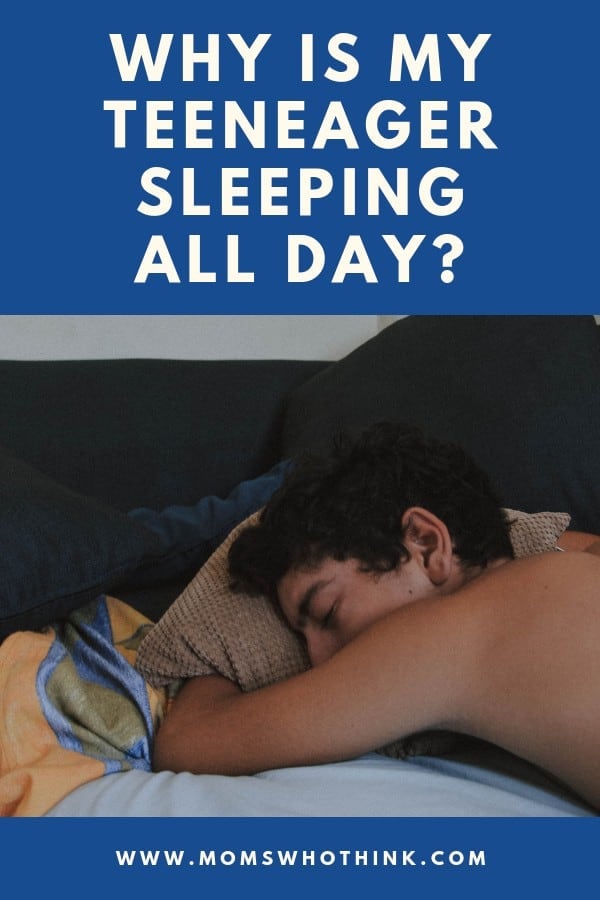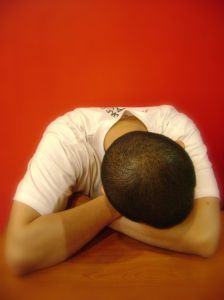Sometimes it seems like teenagers do nothing but sleep. They sleep in class. They sleep on the bus and in the car. They oversleep in the morning. They're still sleeping in the afternoon. In fact, the one time you can pretty much guarantee your teen won't be sleeping is when everyone else in the family should be. As a parent, you may find the whole thing a bit frustrating, to say the least.
Not only is your child moving into a more independent phase of their life, but they're sleeping away any hope you had of ever spending time with them- not to mention the time they should be spending on homework and chores.
Still, they say it's normal, so the question is: why? And what can you do about it? Should you do anything about it?

The Teenage Sleep Cycle
The truth is that while teens are nearing adulthood, physiologically they are still growing kids and they simply need their sleep. The average teen requires around nine hours of sleep a night. Unsurprisingly, most of them don't get it. While we may have ideas about curfews, few of us are willing to even try to enforce a bedtime at that age, and rightfully so.
Teens are also at a stage in their lives when they are exploring their independence. That, coupled with a physiological change in their circadian rhythms, means that they feel most awake when they should be thinking about calling it a night. Some teens find they simply cannot fall asleep until long after eleven. To add even more weight to this problem, most teens wind up in schools that, for the first time in their lives, start much earlier in the day. So in essence, they go to bed late and get up early during the week, never getting the full amount of sleep necessary for their continued wellbeing.
Dealing With it Gracefully
Not surprisingly, most teens cope in a variety of ways that really only exacerbate the problem. In the morning, they drink coffee to help themselves feel more alert. Then they continue to drink it all day. The inevitable result is that they're wide-awake when it's time for bed. So, they continue on with their week and get less and less sleep. When the weekend comes, they throw themselves into the luxury of sleeping in and staying up late. This replenishes their sleep, but it also throws their schedule even further out of whack. Ill-timed naps and mentally-invigorating evening activities make things even worse.
Essentially, your teen is caught in a cycle that they didn't start and need help ending. In order to make the best of the situation, your teen should put themselves on a regular sleep schedule that does not change on the weekends or weekdays. They should try to set an evening wind down routine that avoids TV and computers and instead tells their body its time to think of sleep. Finally, they should avoid caffeine for at least five hours before bed. If they do all this, they'll find they get their eight to nine hours and you'll get your teen back.
How You Can Help
While you won't find enforcing a bedtime too easy at this age, there are some things you can do to help your teen get restful sleep when they are sleeping. One of these things is to ensure the environment they're sleeping in is conducive to sleep.
Consider how their bedroom is at night. Is there a lot of light coming in from outside? Is there a lot of street noise? These are two things that could make it hard for your teen to get to sleep and stay asleep. If your teen's bedroom has a lot of light coming in at night, install some blackout curtains to help.
For noise, there are a couple of things you can do. If your teen prefers some noise, you can try to mask the sound of cars by buying them a white noise machine or running a box fan in the evening. If they're finding it hard to sleep well with the noise coming from outside, buy them some earplugs.
If your teen doesn't want blackout curtains or you can't afford them, a sleeping mask is a cheaper alternative. Let your teen pick out one that they like. They'll appreciate the ability to exercise independence. A sleeping mask will block out a lot of light, allowing your teen to fall asleep and stay asleep more easily.
With a little help, your teen can have a room that allows them to fall asleep as easily as possible. If your child is having trouble sleeping despite these changes, consider whether anxiety may be keeping them asleep. As a final note, if your teen suddenly begins sleeping a lot more often than usual, it may be indicative of a mental health issue like depression. Talk to them and determine if they need to speak to a counselor.
